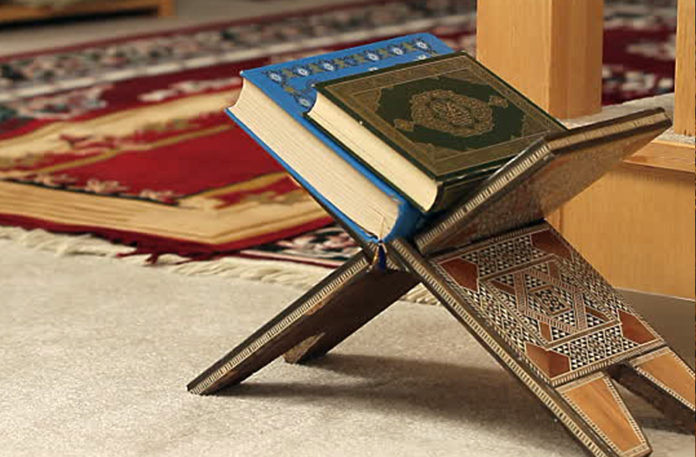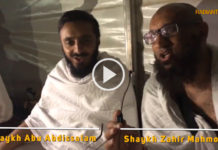His name was unusual and incomplete. Julaybib means, small grown. It is the diminutive form of the word Jalbab. The name is an indication that Julaybib was small and short. More than that, he is described as being damam which means ugly, deformed, or of repulsive appearance. Even more disturbing, for the society in which he lived, Julaybibs lineage was not known. There is no record of who his mother and father were, or to what tribe he belonged. This was considered a serious disability in his society. Julaybib (RA) could not expect any compassion, protection, or support from a society that placed a great deal of importance on family and tribal connections. In this regard, all that was known of him was that he was an Arab and that, as far as the new community of Islam was concerned, he was one of the Ansar. He was shunned in his society. As an example, Abu Barzah, of the Aslam tribe, prohibited him from entering his home, and he told his wife:
| Do not let Julaybib (RA) enter among you. If he does, I shall certainly do something terrible to him. |
Was there any hope for Julaybib (RA) to be treated with respect and consideration? Was there any hope for him to find emotional satisfaction as an individual and as a man? Was there any hope for him to enjoy the relationships that others take for granted? And in the new society emerging under the guidance of the Prophet ﷺ, was he so insignificant as to be overlooked in the preoccupation with the great affairs of state and in the supreme issues of life and survival which constantly engaged the attention of the Prophet ﷺ? Just as he was aware of the great issues of life and destiny, the Prophet ﷺ, who is mercy for all humanity, was also aware of the needs and feelings of his most humble companions.
With Julaybib (RA) in mind, the Prophet ﷺ went to one of the Ansar and said: I want to have your daughter married.
| How wonderful and blessed, O Messenger of Allah, and what a delight to the eye (this would be), |
replied the Ansari man with obvious joy and happiness.
I do not want her for myself, added the Prophet ﷺ.
| Then for whom, O Messenger of Allah? |
asked the man, obviously somewhat let down.
The Ansari must have been too shocked to give his own reaction so he replied:
| I will consult with her mother. |
And off he went to his wife.
| The Messenger of Allah ﷺ wants to have your daughter married, |
he told his wife.
She was thrilled.
| What a wonderful idea and what a delight to the eye (this would be), |
she said.
| He does not want to marry her himself, but he wants to marry her to Julaybib (RA), |
he added.
She was flabbergasted!
| To Julaybib (RA)? No, never to Julaybib (RA)! No, by the Living Allah, we shall not marry (her) to him. |
she protested. As the Ansari was about to return to the Prophet ﷺ to inform him of what his wife had said, the daughter, who had heard her mothers protestations, asked:
| Who has asked to marry me? |
Her mother told her of the Prophet ﷺs request to marry her to Julaybib (RA).When she heard that the request had come from the Prophet ﷺ, and that her mother was absolutely opposed to the idea, she was greatly perturbed and said:
| Do you refuse the request of the Messenger of Allah Taala? Send me to him, for he shall certainly not bring ruin to me. |
This was the reply of a truly great person who had a clear understanding of what was required of her as a Muslim. What greater satisfaction and fulfilment can a Muslim find than in responding willingly to the requests and commands of the Messenger of Allah Taala! Truly, this companion of the Prophet ﷺ, even though we do not know her name, set an example for all of us to obey the Quranic command:
| Whenever Allah and His Messenger have decided a matter, it is not for a believing man or woman to claim freedom of choice in so far as this matter is concerned. And he who disobeys Allah and His Messenger has, most obviously, gone astray. [Al-Ahzab 33:36] |
This was revealed in connection with the marriage of Zaynab bint Jahsh and Zayd bin Harithah, which was arranged by the Prophet ﷺ to show the egalitarian spirit of Islam. Zaynab (RA), at first, was highly offended at the thought of marrying Zayd (RA), a former slave, and refused to marry him. The Prophet ﷺ prevailed upon them both and they were married. The marriage however ended in divorce and Zaynab was eventually married to the Prophet ﷺ himself.
It is said that the Ansari girl read the verse to her parents and said:
| I am satisfied, and submit myself to whatever Allahs Messenger ﷺ deems good for me. |
The Prophet ﷺ heard of her reaction and prayed for her:
| `O Lord, bestow good on her in abundance and make not her life one of toil and trouble. |
It is said that among the Ansar, there was not a more eligible bride than her. She was married by the Prophet ﷺ to Julaybib (RA), and they lived together until he was killed. He went on an expedition with the Prophet ﷺ, and an encounter with some mushrikin ensued. When the battle was over, the Prophet ﷺ asked his companions: Have you lost anyone? They named their relatives or close friends who were killed. Another group answered that they had lost no close relative whereupon the Prophet said: But I have lost Julaybib (RA). Search for him in the battlefield.
They searched and found him beside seven mushrikin whom he had struck before meeting his end. The Prophet stood up and went to the spot where Julaybib ,his short and deformed companion, lay. The Prophet of Allah stood over him and said: He killed seven and then was killed? This man is of me and I am of him. He repeated this two or three times. The Prophet then took him in his arms and it is said that he had no better bed besides the forearms of the Messenger of Allah.
The Prophet ﷺ then dug for him a grave, and himself placed him in it. The Prophet of Allah ﷺ did not wash him, for the one slain in the Way of Allah is not washed before burial. Julaybib (RA) and his wife are not among the companions of the Prophet whose deeds of obedience and valour are well known. The little that is known about them demonstrates how the meek and the humble were given hope and dignity by the Prophet ﷺ where once there was only despair and self-debasement.
The attitude of the unknown and unnamed Ansari girl, who readily agreed to be the wife of a physically unattractive man, reflected a profound understanding of Islam. It reflected the effacement of personal desires and preferences, even when she could have counted on the support of her parents. It reflected a total disregard for social norms and pressures. It reflected, above all, a ready and unshakable confidence in the wisdom and authority of the Prophet in submitting herself to whatever he deemed good. This is indeed the attitude of the true believer.
In Julaybib (RA) there is the example of a person who was regarded as a social outcast because of his mere appearance. Given confidence by his faith in Allah, the Glorious, and encouragement by the noble Prophet ﷺ, he was able to perform great acts of courage and was blessed by the most virtuous death a believer could ever hope for death fighting in the Way of Allah, the Supreme. This led to the commendation which should be the desire of every believer: the commendation of the Prophet of Allah ﷺ: He is of me, and I am of him.
Footnote
Taken from haqislam.org
(NOTE: If you want to build a strong and powerful relationship with Allah, check out Islamia TV, where you can watch Islamic speakers from across the globe deliver inspiring and motivational courses. Learn more at www.islamia.tv.)





















